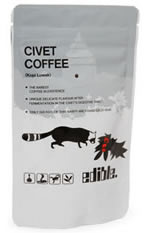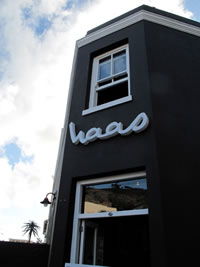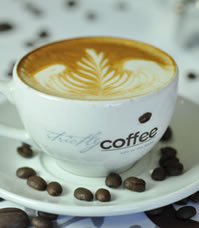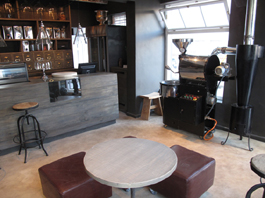A few days after we featured Kopi Luwak, the “out of the butt into your cup” coffee, we discovered that this rare coffee is now available in South Africa.
A newly opened boutique roastery and espresso bar in Cape Town is selling one of the world’s most expensive coffees, a rare and naturally sweet-tasting bean that has been through the digestive system of the Asian palm civet which removes all traces of bitterness. Known as Kopi Luwak, the Indonesian coffee sells locally for a little shy of R3 000 a kilogram or R80 served by the cup, and is at present available exclusively through the Haas Coffee Collective, attached to the lifestyle design store of hand-made objects, Haas Design Collective in Rose Street in the Bo-Kaap.
 Kopi Luwak, with a caramel-chocolate taste, takes its name from Kopi, the Indonesian word for coffee and Luwak, the Asian palm civet (Paradoxurus hermaphroditus) that feasts on the ripest, sweetest red coffee cherries growing on coffee trees in Sumatra. Once the Luwak eats the cherry, the parchment-covered coffee beans inside are passed through its digestive system, with a unique combination of enzymes in the stomach breaking down the proteins to remove all traces of bitterness. Still intact even after being excreted, the parchment cover protects the green coffee beans. In a very labour-intensive process, the beans are collected from the faeces of civets and the parchment is removed. The coffee is then thoroughly cleaned and sun-dried before being sold.
Kopi Luwak, with a caramel-chocolate taste, takes its name from Kopi, the Indonesian word for coffee and Luwak, the Asian palm civet (Paradoxurus hermaphroditus) that feasts on the ripest, sweetest red coffee cherries growing on coffee trees in Sumatra. Once the Luwak eats the cherry, the parchment-covered coffee beans inside are passed through its digestive system, with a unique combination of enzymes in the stomach breaking down the proteins to remove all traces of bitterness. Still intact even after being excreted, the parchment cover protects the green coffee beans. In a very labour-intensive process, the beans are collected from the faeces of civets and the parchment is removed. The coffee is then thoroughly cleaned and sun-dried before being sold.
Sumatra is the world’s largest producer of Kopi Luwak, reputed to be the most expensive coffee in the world. A single cup of espresso made from Kopi Luwak sold for £50 in a brasserie in London in 2008.
 The Haas Coffee Collective is a collaboration between a family-run coffee importer and roasting specialist and a creative and design team. The partners are Hanno Schwartz of Strictly Coffee, a garagiste winemaker, who now trades in specialty coffees that he roasts himself and sells throughout South Africa with his wife Rènsché, who is a marketing specialist; Francois Irvine, an established artist and designer and founder member of the Haas Design Collective, and former executive creative director of a leading advertising agency, Glynn Venter.
The Haas Coffee Collective is a collaboration between a family-run coffee importer and roasting specialist and a creative and design team. The partners are Hanno Schwartz of Strictly Coffee, a garagiste winemaker, who now trades in specialty coffees that he roasts himself and sells throughout South Africa with his wife Rènsché, who is a marketing specialist; Francois Irvine, an established artist and designer and founder member of the Haas Design Collective, and former executive creative director of a leading advertising agency, Glynn Venter.
Schwartz purchases the collective’s coffee from brokers abroad, buys only green beans and micro-roasts in small batches daily. He says his background in winemaking has helped the operation devise roasting specifications for each batch of coffee. “In many ways, coffee is like wine. Whether it’s a coffee bean or winegrape, the final outcome is to a large extent dictated by the variety, its growing conditions and the ripening. The finishing touches happen in the wine cellar or the roasting process.”
Retailing for R2 850 a kilogram, including VAT, Kopi Luwak is one of the more exotic coffees sold by the Haas Coffee Collective. It also stocks Jamaican Blue Mountain, which carries a globally protected certification mark of origin, for R1 824 a kilogram. Sought-after for its subtle and nutty flavour with a lightly sweet and floral aftertaste, it was apparently the favourite brew of Ian Fleming, whose famous spy hero, James Bond, was known to enjoy it with breakfast.
 “Obviously we only bring in small quantities of specialty coffees such as these, aimed at the serious connoisseur because of their rarity and pricing, but we also offer other gourmet coffees that are more modestly priced, such as Mocha from Yemen,” says Irvine.
“Obviously we only bring in small quantities of specialty coffees such as these, aimed at the serious connoisseur because of their rarity and pricing, but we also offer other gourmet coffees that are more modestly priced, such as Mocha from Yemen,” says Irvine.
Yemen Mocha Matari is one of the oldest grown coffees in the world, according to Schwartz.
“Highly aromatic and complex with an almost gamey taste, it has been cultivated for more than a thousand years. It was first brought to the attention of European merchants some 400 years ago through the port city Al Makha, or Mocha, as many in Europe still call it today.”
The collective only roasts on demand, so the coffee is always fresh. “Ideally you should drink your coffee within two weeks of its having been roasted. Contrary to popular belief, you should store it dry, in an airtight container and not refrigerate or freeze it to retain its freshness,” says Schwartz.
Haas has been careful to position itself as an espresso bar offering fine, rare coffees but where coffee lovers can order their brew in the way they prefer. “There will be no prescriptions as to how our coffees are served. The point is to enjoy your cup, so if you like to have yours with milk or sugar it’s our job to give it to you that way,” contends Irvine.
 Coffees are served with custom-made pastries and wholesome sandwiches. For those in a rush, coffee-on-the-go is also available. In addition to selling coffee beans for at-home consumption, Haas caters to the hospitality trade, including guesthouses, hotels and restaurants.
Coffees are served with custom-made pastries and wholesome sandwiches. For those in a rush, coffee-on-the-go is also available. In addition to selling coffee beans for at-home consumption, Haas caters to the hospitality trade, including guesthouses, hotels and restaurants.
All coffees sourced by Strictly Coffee are shade-grown as a cooler environment protracts the ripening and intensifies the flavours. Other coffees brought in by Strictly Coffee, come from as far afield as Ethiopia, India, Central and South America.
The new coffee outlet forms part of the Haas specialty design store also retailing a range of locally designed furnishings, ceramics, jewellery, accessories and artworks.
In addition to the premium collection of coffees, Haas carries a range of some of the more widely available coffees branded under the Strictly Coffee label.
Based in Robertson, where he has a shop, Schwartz also supplies a range of other more popular and accessibly priced coffees to the hospitality trade countrywide and sells nationally to coffee lovers through an online club. These include single varieties and the blends he creates himself.
Strictly Coffee will also be selling the Haas-branded coffees online.



